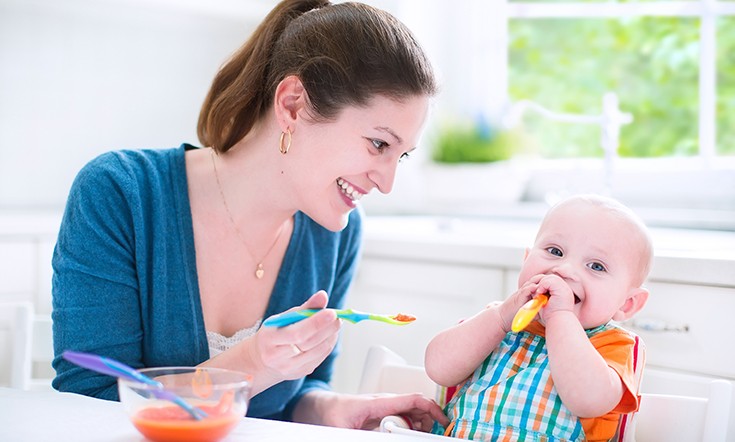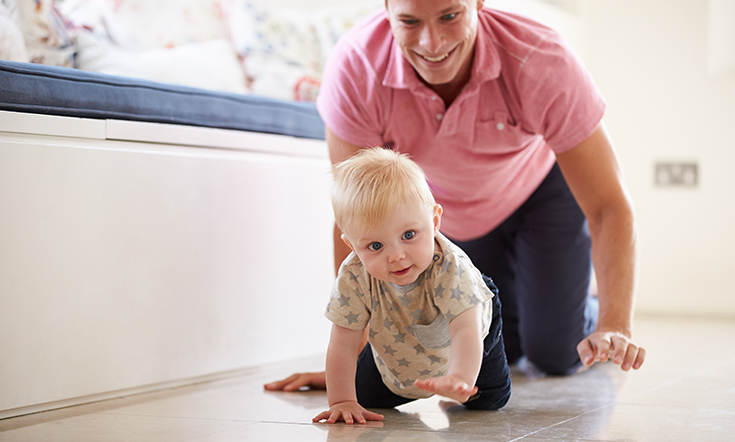

Your baby at 6 – 9 months old. If this is your first baby, you will feel that you and your partner have gone through many changes. As you start the second half of your baby’s first year, you are much more confident as a parent. The days before the birth have become like a distant memory. You are now used to thinking of yourselves as a family of three rather than as a couple.
Let’s take a look at your baby’s development and what they are either doing or will soon be doing at this point.
Development of a Baby 6 – 9 Months Old
During these months, you will notice a distinct change in your baby’s physical and intellectual abilities. At this time, your little one will start sitting unsupported and even getting up into standing position. These are the days when the baby will carefully pull up, usually with the support of a chair or a piece of furniture and then not be able to get down again! Be prepared for some screams and bumps on the bottom as your baby keeps trying this exciting new process again and again.
The same goes for sitting. At first, your baby will use their hands as support. On average this will occur at around the age of seven months, though if your baby is slightly later than this, you do not need to worry. About a month later, your little one will be able to sit unaided, and a month after that, your 9 month old baby will be sitting independently for longer periods.
By the time your baby is around 9 months, they usually slither around by pulling themselves along with their arms and may start crawling at this age. You should not worry too much if your infant decides to cut out the crawling stage. Some babies never crawl, but go straight from the slithering stage to walking, while others enjoy shuffling around on their bottoms for a while rather than actually learning to crawl. Obviously, if something does not look right, you should ask your health care professional for advice.

Babies start to become more aware of the world around them at this age. They realise that if someone has hidden an object from them, it must be around somewhere. If you take an object and hide it under a blanket, the baby will start lifting the blanket to see if it is there. At about eight months, your baby may well go through the annoying stage of throwing objects around just to see where they go. You might want to play peek-a-boo games with the baby to develop this knowledge a little further.
This is the time when the baby starts transferring objects from one hand to the other. They will not have yet developed the pincer grasp of picking things up between the thumb and forefinger, but this is when they try. Among the baby stuff you might want to buy at this age is cups that go inside each other. As the baby grows and their grip improves, they will love putting the cups one inside the other. This helps their coordination and grip and to develop an awareness of size differences.
This is also the time when your baby starts to develop shyness and cries when strangers pick them up. Whereas you used to go on the bus with the baby looking over your shoulder, smiling at everyone sitting behind, you may well find now that the moment a well-meaning passenger coos or smiles at the baby, the response will be a litany of screams. Whenever you leave the room, the baby will start to scream piteously, and when you go to the bathroom you may hear some knocks and crying against the door. This may not start until closer to the end of the baby’s first year. But annoying though this is, this is a common baby age stage and it will pass.
What Should Your Baby Be Eating?
From the age of six months, most parents give their baby solids. The first foods introduced are usually mashed bananas, cooked and mashed carrots, and depending where you live, mashed avocados. Baby rice cereal is another popular food because it is often fortified with vitamins and minerals and is very filling. Your baby will also eat fruits, such as pureed apples, and ground chicken and chicken soup. Some parents like to buy ready made jars of baby foods, which can be very convenient when you are on the move. On the other hand, many parents prefer to make their own baby foods because this way they know what’s in them and the baby will also get more used to the taste of real home cooking.
At this stage, the baby may be breastfeeding or taking a bottle here and there. But the main food baby will be eating will be closer to adult food than before. Of course, you will still be avoiding cow’s milk and dairy products, honey, and strawberries until the age of a year.
Your baby may have produced some teeth by now, though some babies only show a first tooth at around a year. Some babies will have a slight temperature while they are teething, others will be a bit miserable at this time, and others are not too bothered. Small crusts to chew on or hard teething rings can help.
The Patterns of a Sleeping Baby
By this time, your baby should be sleeping through the night and napping once or twice a day as well. Note that some babies are still not so great at night sleeping and may take an interest in their surroundings still. If the baby is still sharing your room, you may need to move them at this stage because being in the room with you might stop them going back to sleep if they wake up slightly at night.






















